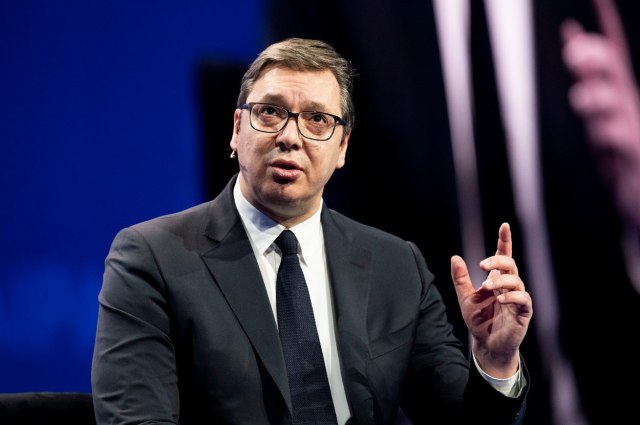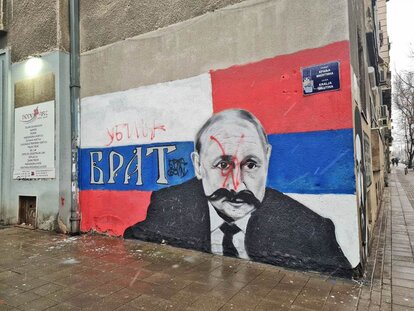Serbia
“Peace. Stability. Vucic.”

Aleksandar Vućić
©Profimedia
International pressure on Serbian President Aleksandar Vucic for his refusal to comply with sanctions on Russia has eased. For this reason, analysts and pollsters now believe that the war in Ukraine will ultimately benefit him more in the final spurt of the election campaign - presidential, parliamentary and local elections will be held in Belgrade and other cities and municipalities in Serbia on 3 April: experience shows that in times of crisis, the frightened rally around their trusted leader.
“Peace – Stability – Vucic”
Vucic stands for "peace and stability", said head of government Ana Brnabic three weeks ago, following his official and rather late presidential nomination.
In a joint press conference with Austrian Chancellor Karl Nehammer in Belgrade on 17 March, she too stressed once again: "We condemn the violation of Ukraine's territorial integrity, but we do not want sanctions." The Austrian head of government showed understanding for this, as Serbia itself is still marked by sanctions and the economy only slowly growing again.
German Foreign Minister Annalena Baerbock, who was in Belgrade on 11 March for a short visit as part of a trip to the Western Balkans, showed less understanding for this behaviour. The condemnation of the UN General Assembly must now be followed by action, she said in a warning at the joint press conference with the President. However, there was no public exchange of blows. The first meeting was friendly and cool, but éclat-free.
All in all, things are looking good for the re-running president and his Serbian Progressive Party (SNS). According to an opinion poll published by daily newspaper Blic in March, the SNS had 53 per cent of the vote and the co-ruling socialist SPS 10 per cent. Since some smaller opposition parties are likely to stumble at the three-percent hurdle, such a result would be enough for a renewed two-thirds majority in parliament and thus to govern through. At best, surprises cannot be ruled out for the Belgrade local assembly.
The opposition, still fragmented, can hardly manage to push through with its issues - corruption, deficiencies in the rule of law, cover-up of scandals, environmental pollution, controlled media landscape, migration of medical professionals and so on - anymore. Even the hints picked up by critical media that opposition parties are once again having problems renting billboards and meeting halls are going largely unheeded in the quicksand of information.
Rejection of the war in Ukraine - but hardly any open criticism of Putin
With regard to the war in Ukraine, opposition politicians criticise Vucic for using this situation to scare voters. But the position of most opposition parties on the Ukraine war does not fundamentally differ from that of the president and government on one crucial point: Hardly any opposition member is in favour of sanctions against Russia - even open criticism of Putin is somewhat frowned upon.
In order to capture the mood of society, references to numerically rather small pro-Russian demonstrations on the one hand and pro-Ukrainian protests on the other are not sufficient, even if this polarisation has been portrayed quite well by a mural ("Brother Putin") in downtown Belgrade created at the beginning of March. For weeks now it has been subjected to constant change through comments ("Murderer"), paintovers and renewed attempts at restoration.

Übermalt: Mörder anstatt Bruder
©Monde.me
Rather, most people’s own experiences of war and flight, which happened only a few decades ago, probably remain unforgotten and determine their views and feelings when pictures and reports from the war in Ukraine evoke these memories with particular intensity.
Media as election campaigners! - Fair election conditions?
In the final spurt of the election campaign, pro-government media and tabloids are once again living up to their reputation of having little or nothing to do with quality journalism. Almost glorifying the president's work, they claim, like an echo of the SNS election campaign, that he has provided Serbian citizens with enough energy and food, while Europe is already struggling with shortages and rising prices. Headlines like "Vucic is a visionary! Thanks to the head of state, Serbia has avoided shortages" or "The world is facing great hunger - Serbia has enough food" are not exceptions but the rule.
As some small sign of progress with regard to election conditions, it can be noted that opposition politicians, at least in the final phase of the election campaign, were allowed to appear somewhat more often on public broadcaster RTS and (for the first time) occasionally even on private stations close to the government, such as Pink or B92, as guests. The still absolutely dominant media presence of father of the nation Vucic is not even remotely endangered by this. Whether it is a visit to an infrastructure project such as the opening of the railway line between Belgrade and Novi Sad together with Hungarian Prime Minister Viktor Orban or a new motorway section, the president is always there and knows how to cast himself in the right light and media spotlight.
